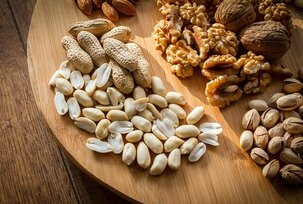A change of diet is not something one should embark on lightly or without carefully thinking through the pros and cons. It has taken many generations to create you, the reader, as you are today. We don’t know what challenges our ancestors may have had to face that threatened their survival; starvation, disease, or failure to reach maturity and procreate, but survive they did and a key part of their survival was what they ate. Up until about a hundred years ago, here in the West and in most other countries, people ate pretty much the same sort of traditional food as previous generations and it was only comparatively recently that the type of basic food began to change with the advent of fast food and the introduction of new food items never seen before such as polyunsaturated seed oils and man-made chemical preservatives and additives.
|
CLIMATE CHANGE THREAT Now, a new threat to our survival, climate change, has made some people want to alter their diet in an effort to play their part in reducing CO2 emissions. Some decide to stop eating meat and become vegetarian or even vegan although in fact, raising animals on pasture is the most efficient way of pulling carbon from the atmosphere and returning it to the soil. POSSIBLE REPERCUSSIONS Adopting a plant-based diet means carefully assessing what the repercussions of eliminating main food groups may be. By cutting out animal-based products such as meat, fish, eggs and dairy there is a real risk of falling short of essential micro-nutrients, especially vitamin B12, iron, calcium and omega 3 fatty acids. VITAMIN B12 is needed for red blood cell production, protection from toxins and for mental health. B12 deficiency can cause paranoia, obsessive-compulsion disorder, tendency to irrational anger and dementia. All animal foods provide B12 but liver is the best source. There is no B12 in plant foods. IRON is needed for red blood cells, energy and immunity. Iron is best assimilated from liver and red meat. CALCIUM. Dairy foods are the best source of usable calcium in Western cultures. EPA & DHA: Omega 3 fatty acids are critical for brain function. The best sources are cod liver oil, organ meats and seafood. These fatty acids cannot be made by the body so you must get them from the foods and beverages you consume. IODINE. Studies show that the iodine content in food of plant origin is lower in comparison with that of animal origin due to a low iodine concentration in the soil. Sources of iodine are seafood and dairy products. An inadequate dietary intake of iodine leads to insufficient production of thyroid hormones, which affects many parts of the body, particularly muscle, heart, liver, kidney and the developing brain. 
|
SPEND TIME ON RESEARCH There are many books available that describe in detail how to become a vegetarian successfully, with advice as to what supplements may be necessary to maintain good health. An important point to remember is that vegetables need to be eaten as fresh as possible. A plant is a living thing, so as soon as it is harvested it will begin to die and its nutritional value will start to wane. Root vegetables will obviously stay fresher longer than green leafy vegetables. Pulses such as lentils and beans, grains and nuts, known as second class protein, can be a good source of nutrition. Do not be tempted to replace meat with soy products, such as tofu, as these are not safe to eat unless they have been fermented. See: Soy Foods, Friend or Foe. WEIGHING UP THE EVIDENCE The Weston Price Foundation offers answers to some of the myths currently circulating that attempt to justify cutting out meat from the diet and becoming vegetarian. MYTH: Livestock is a major source of greenhouse-gas emissions. TRUTH: Only a small percentage of atmospheric methane comes from ruminant flatulence; the largest source of pollution is the burning of fossil fuels for electricity, heat, and transportation. Another notable source of greenhouse gas emissions is from landfill sites; they are the third largest source of methane emissions in the United States. It is true that intensive farms, concentrated animal feeding operations (CAFOs) DO produce large amounts of methane gas and they should be outlawed. MYTH : Beef production requires 2,500 gallons of water per pound of beef. TRUTH: This figure is widely quoted by vegetarians without supporting evidence. The beef industry estimates that a pound of beef requires 435 gallons of water, mostly for grain production to feed the animal. Pasture-raised beef requires only the water that the animal drinks, which works out to about 30 gallons of water per pound of beef, about the same amount used in one shower. MYTH: The human body is not designed for meat consumption. TRUTH: Humans are equipped with an omnivore’s teeth and digestive system. The intestinal tract of a human being is more like that of a dog than a sheep. Animals that live on plant foods do not manufacture hydrochloric acid; have from two to four stomachs and a longer intestinal tract than humans. American dentist Dr. Weston Price in his acclaimed book, Nutrition and Physical Degeneration noted, “As yet, I have not found a single group of primitive racial stock which was building and maintaining excellent bodies by living entirely on plant foods.” MAKING THE RIGHT DECISION Here I have presented some of the facts to help you decide for yourself whether a radical change in what you eat is going to be right for you and one that will keep you healthy. Ultimately, the choice is yours. Bon appétit! |
